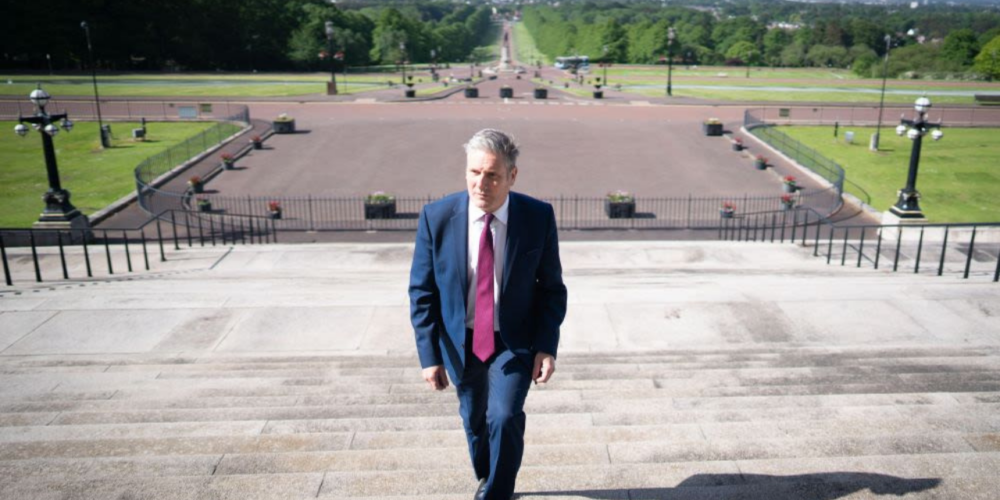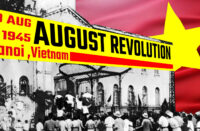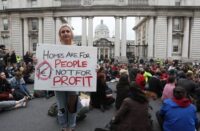The upcoming UK elections are poised to bring Labour to power in Britain. The question that arises is, what implications will a Starmer government have for Ireland? The answer is very little. While Labour’s plan to revoke the Legacy Act is a positive step, their energy, transport, and workers’ rights policies, diluted under monopoly-finance capital’s influence, will not affect the North. The region’s devolved space on workers’ rights, its separate all-Ireland energy markets and rail infrastructure see to that.
On constitutional questions, Labour means no change: a do-nothing approach. Starmer even defied the Good Friday Agreement (GFA) in 2021 by claiming he would campaign for the North to remain within the UK. He then later somersaulted in a speech at Queen’s University Belfast this year where he said he would not intervene. Hilary Benn, prospective Minister of State for the region, has said he won’t even look at polling data given data interpretation problems: it is a political decision for the Assembly to make, he implied. Starmer and Benn know the constitutional question is somewhat hypothetical. Demographic data and statistically inconclusive polling suggest it is not on the immediate horizon.
Given these trends, one prediction for the North is to expect it to trundle on in relative stagnation: a post-imperialist residual hangover locked into what political scientists call negative path dependence. Internally, the statelet faces worsening problems. The recent deal in May between the Executive and the UK government, which will introduce a needs-based factor to the Barnett formula, still presents challenges allocating funds within the region (public sector strikes will likely continue albeit at less intensity than 2022-2023). The Northern capitalist sector, outside of one or two areas, is humdrum, stuck in low productivity, stagnant Research and Development sectors and subject to relatively higher import and export costs. Brain drain among educated youth is a notable feature. All this is before we even factor in the impending polycrisis confronting global capitalism in the next decade.
The situation might stumble on until the Yes vote on unity reaches the threshold it needs by waiting via demographics (which may be a long process if the North’s population only grows by 5% in the next 20 years ,as predicted by NISRA) or by converting enough agnostics/sceptics politically. The Left might speed the latter process if we construct attractive policy proposals on, among other things, integrating imbalanced public sectors, private and public pension transfer, savings conversions under an agreed currency rate to avoid random unfavorable fluctuations and continued mortgage payments under recalibrated interest rates, tuition fees, continued free prescriptions, Stormont’s role (if any), policing reform, harmonising law where imbalances in citizens’ rights, transitional periods etc.
Some sectors are more straightforward to plan for than others as they are well integrated on an all-island basis (e.g. transport and energy), but others are not (e.g. education). The analysis must also inform planning for negotiations with the British government on issues like national insurance transfer. Sources of leverage could be identified for such talks where the British prefer a low-cost walk away. There is also a question as to whether negotiations should be bilateral between the Irish and British governments or involve Northern political representatives. Unlike German unification, the 26 counties are locked into the Eurozone. We cannot determine relevant fiscal and monetary issues concerning unity so EU intervention into the process will result. The more parties, the more complex transitional negotiations.
The above dynamics risk being captured by elite interests. If we can get beyond the tepid Ireland’s Future glitz and ultra-leftist bluster and Ho Chi Minh quotes (see “Imperialism Must Be Confronted”, Socialist Voice, June 2024), the Left could, hypothetically, counter elite interests by initiating activities on unity potentially under some re-working of a popular front like that advocated in Socialist Voice (see “Popular Front”, Socialist Voice, June 2024). In that regard, the Communist Party of Ireland’s event at Féile an Phobail this August 9th could be an interesting place to start.






